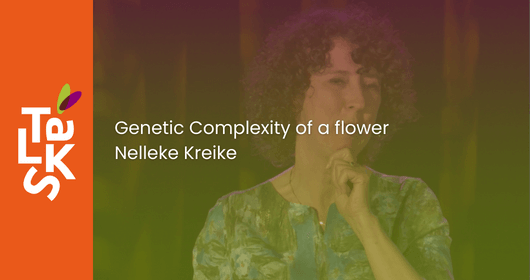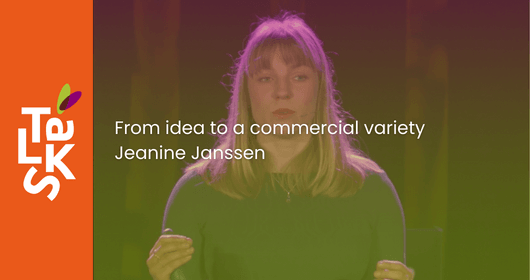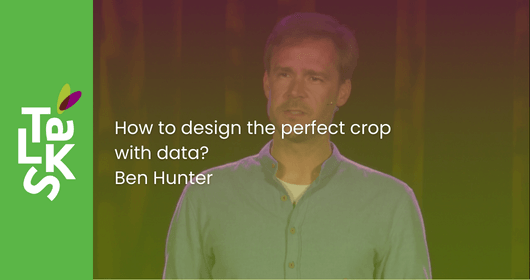Check out the latest videos from our Seed Valley Talks. Professionals in plant science share insights into the latest research topics in the seed sector. This world is changing fast due to climate change, mutating diseases, and an increasing amount of data. It is essential that we keep developing and renewing plant varieties and cultivation methods.

The Genetic Complexity of a Flower
The genetics of flowers are very complex. So how can you take a look at the DNA and know the certain traits of a plant? If you are able to, it can help breeders to breed faster and find the traits they are interested in more easily. In this Talk Nelleke, Lector Green Biotechnology at Hogeschool Inholland, tells in depth about what DNA technologies can actually assist plant breeders to make these beautiful flowers for the future.

From idea to commercial variety
Do you know how all the different flowers got to your garden centre? Or how long it takes to create a new variety? And what it takes to make a plant that is ready for the market? Jeanine, associate breeder at Syngenta Flowers, tells us what it takes to create a new commercial variety.

The challenges of breeding Chrysanthemum
How is it possible there is so much phenotypic variation within ornamentals? How do you develop new varieties of Chrysanthemum that can grow in harsher conditions? How can you select the right plants? Jorian, pre-breeder at Dekker Chrysanten, will answer those questions in his Talk ‘The challenges of breeding Chrysanthemum’.

How to design the perfect crop with data?
Plant breeding is fun: it’s the marriage between genotype and phenotype. Ben, Trait Genetics Lead at Bayer Crop Science tells you how data helps to design a perfect crop. What and how can we identify the genotype with molecular tools? What can we do with that genotypic data? Why is big data powerful for breeding? He will expand on how data makes a difference in the breeding process of the future. Watch it now!

Digital twins in plant breeding
Rick van de Zedde, working at Netherlands Plant Eco-phenotyping Centre at WUR shows us in this Talk why we grow tomatoes, digitally. Phenotyping plants costs hours, this means there is a lot of brainpower wasted. At Wageningen University & Research they develop vision technology specifically for this measurement. And what would we gain if we not only follow the phenotype of our plants, but also grow plants virtually? It becomes possible to predict how plants grow under different circumstances.

Can you eat data?
Can you eat data? Valerio Bianchi, Senior Bioinformatician at Enza Zaden will tell you the answer. Computer science, machine learning, and artificial intelligence are drastically changing the way we produce food today. The secret for this change is to collect a vast amount of data. How is big data used by breeding companies to change the way we produce fruits and vegetables? This is the first video in the series "The growing data puzzle for breeding companies".

The road to microplastic free
Jérôme Garnier shares his concerns about plastic pollution. What can you do to limit microplastic pollution? And how is the seed industry trying to banish microplastic pollution? This is the third Talk in the series "What is the road to sustainable agriculture?".

Microbial masterminds behind crops
Alexandre Jousset talks about if bacteria have the power to change sustainability in agriculture? Why is it relevant how plants and bacteria work as a team, as a community? This video is the first Talk in the series "What is the road to sustainable agriculture?".

How to breed for organic farmers?
Bram Weijland talks about how new crops are developed by a hybrid between conventional and organic breeding. How do these disciplines need one another? Why are they together responsible for more sustainability in the seed sector. This video is the first Talk in the series "What is the road to sustainable agriculture?".

How to deal with climate change?
Anoma Lokossou shares how she enthusiastically started to grow her own vegetables. And how this caused her to become a plant researcher. How does her research help growers cope with climate change? This video is the third Talk in de series "How to feed 2 billion more mouths by 2050".

Can better seeds change lives?
Maaike Groot, Manager Public Affairs at East-West Seed answers this question. We, as a seed sector, need to help the smallholder farmers. Growing a business and giving the opportunity to feed his community. Which will make him one of the many farmers that feed the growing world population. This video is the second Talk in the series "How to feed 2 billion more mouths by 2050".

Plant your future
Ernst van den Ende, Managing Director Plant Sciences Group at Wageningen UR elaborates on why there is an urgency for healthy food in the world. How is plant breeding contributing to this need? This video is the first Talk in the series "How to feed 2 billion more mouths by 2050".

Can plants be vaccinated?
Michel Haring, Professor at the University of Amsterdam elaborates on this question. This video is the first Talk in the series "How to beat the next plant virus pandemic".

Self-defense for plants
What to judo throws and plants have in common? Karin Posthuma, Manager Phytopathology at Enza Zaden, explains more. This video is the second Talk in the series "How to beat the next plant virus pandemic".

Turning enemies into allies
If you were a seed, how would you protect yourself? Carola Peters, Researcher at Incotec, gives more insight into how fungi and bacteria protect seeds and plants against diseases. This video is the third Talk in the series "How to beat the next plant virus pandemic".

